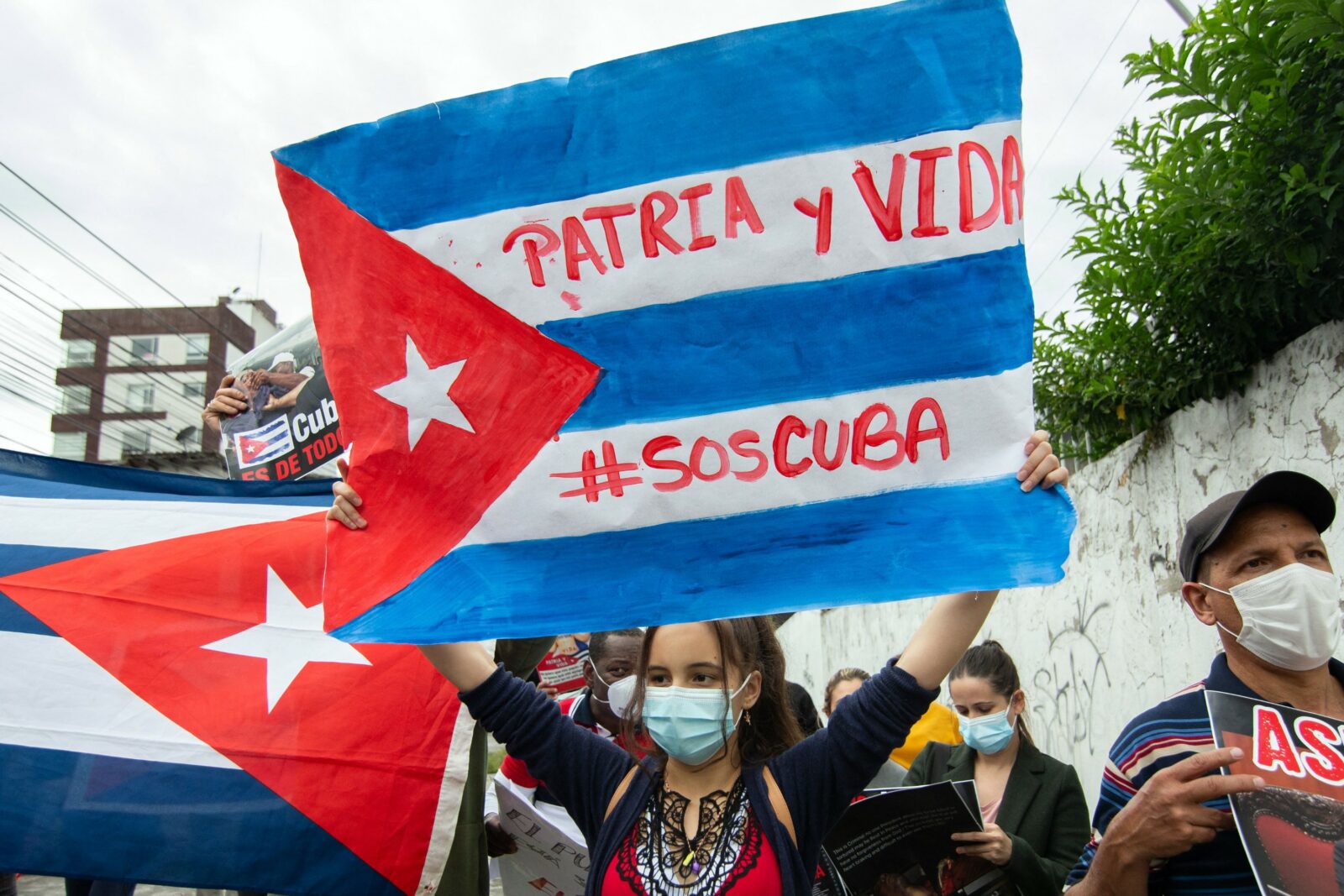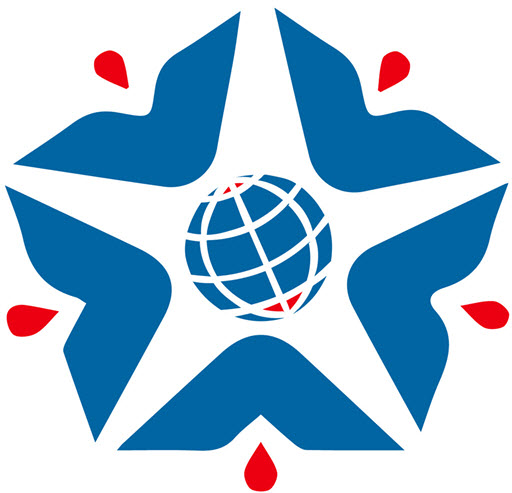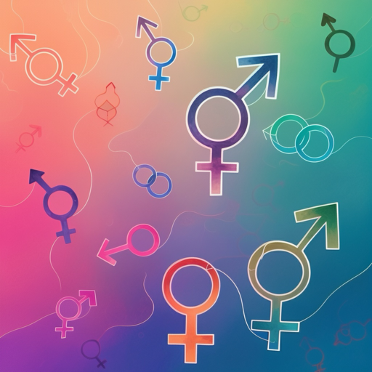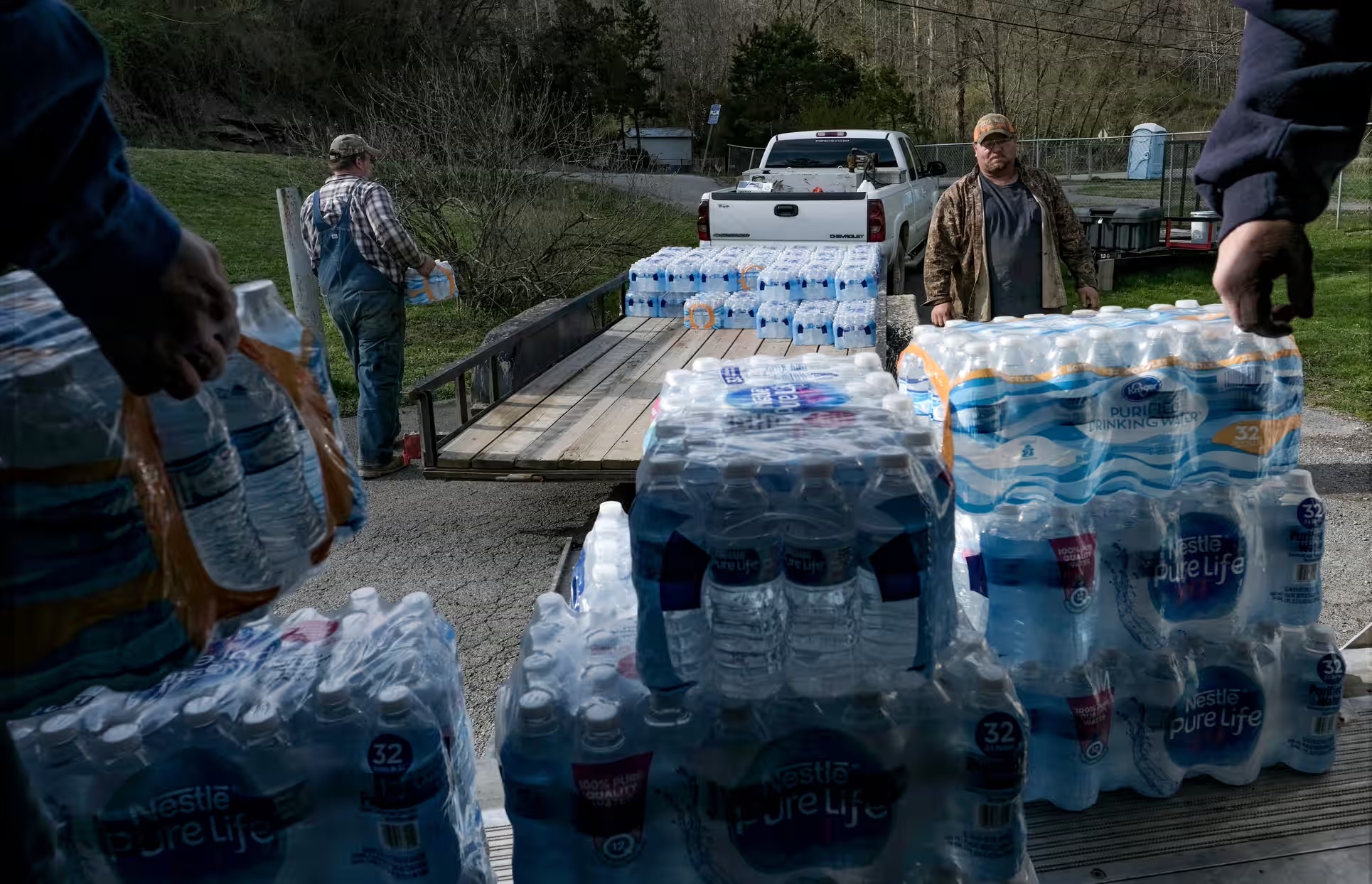
Katerina Fernandez, Associate Member, Immigration and Human Rights Law Review
I. Introduction
The Cuban Revolution of 1959, a historical turning point in Cuba led by Fidel Castro, ushered in a new era marked by political repression and systematic restriction of civil liberties.[1] Since the revolution, the Cuban government has tightly controlled dissent against its decisions, curbing fundamental rights such as freedom of expression and assembly.[2] This repression reached a critical juncture in July 2021, as demonstrations arose sparked by a worsening economic crisis, widespread shortages of essential goods, and the government’s mishandling of the COVID-19 pandemic.[3] The protests saw thousands of Cubans take to the streets, voicing grievances over deteriorating living conditions and government inaction.[4] In response, the Cuban government employed harsh measures, including mass arrests, censorship, and violent crackdowns on demonstrators.[5] This systematic repression, aimed at silencing dissent, has also led to a significant increase in the emigration of Cubans, with many fleeing political persecution and economic despair.[6]
This blog will explore the socioeconomic and political factors that ignited the July 2021 protests, examining the Cuban government’s repressive response and subsequent mass migration. In light of these issues, it will evaluate Cuba’s obligations under international human rights law and propose reforms in asylum and refugee policies across the United States and the European Union (EU).
II. Background
A. Cuba’s History of Political Repression
Since the Cuban Revolution of 1959, the island nation has been dominated by a single-party system under the Cuban Communist Party (PCC), which has maintained its grip on power through a mix of ideological control and political repression.[7] Early on, the regime consolidated its authority by eliminating political opposition.[8] Hundreds of opposing leaders, activists, and intellectuals were either imprisoned, executed, or forced into exile.[9] The new government established a tightly controlled state apparatus, including a secret police network that monitored citizens and suppressed any hint of objection to its actions and decisions.[10]
By the early 1960s, Cuba’s government had restructured the legal system to support the authoritarian regime.[11] The new government utilized its existing penal code to silence opposition by criminalizing “counter-revolutionary” activities.[12] Vaguely defined laws allowed for the prosecution of citizens on charges such as “enemy propaganda,” “illegal association,” and “public disorder.”[13] These laws created an environment where any criticism of the government could be construed as a criminal act.[14] PCC’s crackdown on civil liberties further extended to the nationalization of the press, placing all media under state control, effectively silencing independent journalism, and eliminating avenues for dissent.[15]
Political repression continued under Fidel Castro’s brother, Raul Castro, who assumed formal leadership in 2008 after his brother’s death.[16] Under his government, state security forces routinely subjected political opponents to arbitrary detentions, travel bans, and harassment.[17] One prominent example is the treatment of the Damas de Blanco (Ladies in White), a group of women who advocate for the release of political prisoners.[18] These women were often violently dispersed during peaceful marches, illustrating the government’s intolerance toward organized opposition.[19]
In 2021, President Miguel Díaz-Canel introduced a new penal code, further entrenching the government’s ability to prosecute dissidents through broad legal provisions.[20] These laws intensified penalties for “public disorder” and “sedition,” reflecting the government’s fear of growing public discontent.[21] Further, Decree-Law 35, which governs telecommunications and cyberspace, expanded state control over digital communication platforms, furnishing the government with new tools to surveil and punish citizens using social media to criticize the state.[22] Despite occasional international pressure and Cuba’s ascension to human rights instruments, the Cuban government continues to exploit its legal system to justify repressive actions, maintaining its stranglehold on the population.[23]
B. The 2021 Protests: Contributing Factors and the Government’s Response
In the summer of 2021, prolonged electrical blackouts, crumbling infrastructure, and the government’s failure to address widespread shortages and soaring inflation pushed thousands of Cubans to protest.[24] While the initial protests were triggered by economic hardship, they quickly took on a political dimension, with demonstrators chanting slogans such as Libertad (Freedom) and Patria y Vida (Motherland and Life).[25] These slogans encapsulated a broader demand for democratic reforms, as protesters openly called for the resignation of President Díaz-Canel and an end to PCC’s monopoly on power.[26]
The government’s response to the unprecedented protests was swift and severe. The government quickly deployed security forces to suppress the demonstrations, with widespread reports of human rights violations, including mass arrests, physical abuse, and trials conducted without due process.[27] Security forces detained over 700 people, charging many with severe offenses that carry lengthy prison sentences such as sedition.[28] Beyond physical repression, the government implemented nationwide internet blackouts, disrupting communications to stymie further mobilization of protesters.[29] Independent journalists and activists were subjected to heightened surveillance and arbitrary detention, creating an atmosphere of fear and intimidation.[30] Human rights organizations like Amnesty International and Human Rights Watch have documented multiple cases of abuse as the Cuban regime sought to quash unrest and reinforce its dominance.[31]
C. Surge in Emigration
Increased governmental repression, which reached new heights after the July 2021 protests, has driven an unprecedented exodus of Cubans, marking one of the largest waves of migration in recent history.[32] Historically, large-scale emigration from Cuba has often followed heightened political or economic crises.[33] These emigration waves began shortly after the Cuban Revolution of 1959, when thousands of Cubans fled to the United States, particularly during events like the Camarioca boatlift in 1965 and the Mariel boatlift in 1980.[34] However, the current surge of emigration is distinct in its sheer volume—with over 300,000 Cubans leaving for the United States in 2022 following the 2021 protests—and the specific socio-political dynamics that have fueled it.[35]
In the aftermath of recent protests, the citizens fleeing Cuba are not solely economic migrants but also political dissidents, artists, intellectuals, and members of civil society who fear persecution under the increasingly authoritarian regime.[36] These individuals represent the country’s intellectual capital and potential for future democratic reforms.[37] Their departure weakens the internal resistance to the regime and diminishes the country’s capacity for organic political change.[38] In particular, the loss of young professionals compounds an existing brain drain, as Cuba’s economy, already beleaguered by years of stagnation and mismanagement, is further deprived of the skilled workforce needed for recovery and development.[39]
This surge in emigration has significant implications not only for Cuba’s internal dynamics but also for its international relations. As the number of Cubans seeking asylum grows, host countries face the challenge of processing increased numbers of asylum claims while balancing domestic concerns over immigration.[40] Moreover, the exodus of Cubans underscores the broader human rights crisis within the country, placing additional pressure on international organizations like the United Nations and the Organization of American States (OAS) to hold the Cuban government accountable for its abuses.[41]
III. Discussion
A. The Role of International Human Rights Law
Cuba’s repressive measures violate multiple international human rights instruments, including the Universal Declaration of Human Rights (UDHR) and the International Covenant on Civil and Political Rights (ICCPR). These instruments guarantee fundamental freedoms, such as the right to peaceful assembly, freedom of expression, and protection from arbitrary detention—rights the Cuban government systematically violates.[42] Although no country has formally signed the UDHR to incorporate the document into the United Nations Charter, Cuba must respect it as a United Nations member state.[43] Additionally, Cuba signed the ICCPR on February 28, 2008, becoming a party to the agreement, meaning the Cuban government is bound by the ICCPR.[44] Despite being bound by these international agreements, the Cuban government’s actions violate international human rights law by targeting, arresting, and unjustly punishing protesters, journalists, and activists.
Under the UDHR, Articles 19 and 20 guarantee “the right to freedom of opinion and expression”[45] and “the right to freedom of peaceful assembly and association.”[46] The Cuban government has systematically violated these articles, particularly in its response to the July 2021 protests, where peaceful demonstrators were met with violent repression, arbitrary detentions, and censorship.[47] The Cuban government’s actions stand in stark contrast to the UDHR’s vision of promoting human dignity and liberty, evidenced by its targeting of dissenters through mass arrests and suppression of independent journalism.[48] By failing to uphold these fundamental human rights, Cuba disregards its international obligations and undermines the global consensus on the inherent dignity and freedoms everyone should enjoy.[49] The unfortunate truth is that the UDHR is not a binding document and lacks an enforcement mechanism; however, not all hope is lost as solace may be found in a binding document: the ICCPR.
Article 19 of the ICCPR states,
- Everyone shall have the right to hold opinions without interference.
- Everyone shall have the right to freedom of expression; this right shall include freedom to seek, receive, and impart information and ideas of all kinds, regardless of frontiers, either orally, in writing or print, in the form of art, or through any other media of his choice.[50]
Alongside Article 19, Article 21 of the ICCPR guarantees “the right of peaceful assembly.”[51] Yet, the government’s use of vaguely worded laws to criminalize dissent and enact drastic post-protest measures contravenes these international commitments.[52] Additionally, PCC’s widespread censorship, including internet blackouts, further violates these ICCPR provisions.[53]
Under Article 9 of the ICCPR, “No one shall be subjected to arbitrary arrest or detention.”[54] However, this right has been systematically ignored in Cuba’s crackdown on activists, journalists, and protest participants.[55] International human rights bodies, including the United Nations and the OAS, have called for Cuba to comply with its human rights obligations.[56] Unfortunately, these bodies lack enforcement mechanisms, and Cuba’s continued defiance remains largely unchecked.[57]
B. The Impact of Mass Migration
1. Immigration Laws in Host Countries
Mass migration from Cuba, exacerbated by the government’s repression after the 2021 protests, has created significant challenges for Cubans seeking asylum and the countries receiving them.[58] Both the United States and the EU face mounting pressures to accommodate these migrants within their respective asylum frameworks, which have become increasingly restrictive and complex.[59] As the volume of Cuban migrants grows, the leaders in these regions must navigate resource allocation challenges, policy consistency, and public opinion, all while balancing humanitarian obligations and border security concerns.
Cuban asylum seekers face numerous challenges, many of which stem from evolving U.S. immigration policies that restrict access to asylum.[60] In the United States, Cuban migrants historically benefited from particular immigration policies, such as the “wet foot, dry foot” policy, which allowed Cubans who reached U.S. soil to remain and eventually apply for permanent residency.[61] However, the Obama Administration rescinded this policy in 2017, leaving many Cubans subject to the same immigration procedures as other asylum seekers.[62] Furthermore, recent U.S. policies have increasingly restricted access to refuge, especially at the southern border.[63] For example, new policies introduced by the Biden administration have placed significant barriers to entry for Cuban asylum seekers, requiring them to apply through a parole process with strict qualifications.[64] Applicants must have a U.S. sponsor, pass background checks, and possess valid travel documents.[65] Unfortunately, the growing number of asylum seekers strains an already overburdened immigration system.[66] Border patrol resources are stretched thin, and backlogs in immigration courts lead to increased wait times for asylum hearings.[67]
In the EU, Cuban migrants are subject to the Common European Asylum System (CEAS), which aims to harmonize asylum policies across member states while ensuring protection in line with the Refugee Convention and the European Convention on Human Rights.[68] Asylum seekers in the EU must apply in the first EU country they enter under the Dublin Regulation, which determines which member state is responsible for examining their asylum claim.[69] Countries like Spain and Italy, which have historical and cultural ties with Cuba, have seen a significant number of Cuban asylum seekers.[70] Cuban migrants often seek asylum in these countries due to their shared language and more established Cuban communities. However, the asylum processes in the EU vary significantly between member states, leading to disparities in the treatment of Cuban asylum seekers.[71] While countries like Spain have a relatively high acceptance rate for Cuban asylum seekers, others have more stringent criteria and slower processes.[72] The EU has faced criticism for its slow and bureaucratic asylum procedures, which can leave Cubans in legal limbo for extended periods.[73] Furthermore, with rising anti-immigration sentiment in some EU countries, Cuban migrants may face additional challenges as they navigate a system that is often politically charged.[74]
2. Consequences for Cubans
The impact of mass migration on Cubans, both those fleeing the country and those left behind, is profound and multifaceted. For many, the decision to migrate is driven by political repression, economic hardship, and a lack of personal freedoms.[75] The journey is difficult, often involving dangerous sea crossings or treacherous land routes through Central America.[76] Many Cubans attempting to escape the island face extortion, human trafficking, and other forms of exploitation as they seek refuge in countries like the United States or European nations.[77] The physical and emotional toll of these journeys can be devastating, leading to trauma and long-lasting psychological impacts, especially for families separated during the process.[78]
Once Cubans reach the countries where they seek asylum, the challenges do not cease. Many struggle to integrate into new societies due to language barriers, legal uncertainty, and cultural differences.[79] As asylum seekers, Cubans often face lengthy legal processes before gaining any form of protected status.[80] During this period, they may be unable to work or access essential services, leaving them in a state of limbo and vulnerable to exploitation.[81] Additionally, those whose asylum claims are denied endure anxiety surrounding the constant threat of deportation back to Cuba, where they may face imprisonment or further persecution.[82]
A significant impact on Cubans who stay behind is the loss of skilled professionals and intellectuals due to the brain drain created by mass migration.[83] Many fleeing Cuba are well-educated individuals, including doctors, teachers, artists, and engineers, who seek better opportunities and freedoms abroad.[84] Their departure depletes Cuba of much-needed human capital and weakens the potential for future democratic reforms.[85] The exit of young professionals compounds Cuba’s economic difficulties, as the nation is left with a shrinking workforce and fewer resources to address pressing crises.[86]
On a personal and familial level, the impact of migration is often heart-wrenching. Families are frequently torn apart, with some members remaining in Cuba while others seek refuge elsewhere.[87] The separation of loved ones for any time creates a lasting emotional and financial strain on Cuban families.[88] Remittances sent back home by migrants are a lifeline for many Cubans, providing essential financial support in a country with scarce economic opportunities.[89] However, dependence on these remittances creates new challenges, reinforcing economic inequalities and deepening divides between those with family abroad and those without.[90] Moreover, the social fabric of Cuban communities is disrupted as large segments of the population leave in search of better lives.[91] The constant migration flow creates a sense of instability and loss within Cuba, where many citizens feel their only viable future lies outside their homeland.[92] This sense of hopelessness and disillusionment further erodes any potential for civic engagement or grassroots movements that could challenge the government and advocate for reform.[93]
3. Proposed Reforms
For Cubans fleeing political repression, the restrictive nature of immigration policies exacerbates any existing danger they face at home.[94] Asylum processes must be more responsive to the specific circumstances of Cuban nationals. As it stands, U.S. immigration laws vaguely define the term “persecution.”[95] The overly broad and subjective interpretation of “persecution” in immigration law can undermine its protective intent, as those in genuine need may be denied asylum due to inconsistent or restrictive interpretations.[96] As current policies favor those with economic resources and sponsors in the United States, many potential applicants are effectively excluded from seeking protection.[97] To address these issues, asylum procedures for Cuban nationals should be fast-tracked, particularly for individuals with documented involvement in civil society or independent journalism.[98] This approach ensures that those most vulnerable to persecution receive protection promptly.
The EU should create a specialized asylum pathway for individuals fleeing political repression, particularly from countries with recognized systemic human rights abuses like Cuba.[99] Under this reform, the EU could establish a fast-track asylum process that prioritizes claims from Cuban nationals with verified records of activism, independent journalism, or civil society involvement, streamlining their application processes to reduce wait times and expedite decisions.[100] Enhancing integration programs, including language training, vocational skills, and psychological support, would ease Cuban migrants’ transition into European society and help them rebuild their lives in a stable and supportive environment.[101]
The United Nations has a critical role to play in holding the Cuban government accountable for its human rights abuses.[102] The United Nations must take a stronger stance by utilizing its human rights mechanisms, including the Human Rights Council (HRC), to condemn Cuba’s repression and call for tangible reforms.[103] An HRC condemnation would serve as a formal denunciation of Cuba’s actions, putting international pressure on the government and drawing global attention to its systemic violations.[104] It could also pave the way for coordinated actions, such as targeted sanctions or the creation of an independent fact-finding mission to document abuses and ensure accountability.
Moreover, Cuba’s violations of the ICCPR, to which it is a signatory, must not go unchallenged.[105] The Cuban government has consistently breached its obligations under the ICCPR by curtailing basic freedoms, such as the right to peaceful protest, freedom of the press, and the right to a fair trial.[106] The United Nations should invoke Cuba’s ICCPR commitments to hold the regime accountable, urging it to comply with international law.[107] While enforcement mechanisms for treaty violations are limited, persistent advocacy through the HRC and other U.N. bodies could amplify diplomatic pressure.[108] Additionally, collaborative efforts with regional organizations like the OAS and non-governmental organizations could bolster accountability mechanisms and support the Cuban people in their fight for justice and freedom.[109]
The Cuban government’s continued repression of civil society, independent journalism, and political dissent underscores the need for robust international asylum and refugee protections for Cuban nationals. Reforming asylum laws to accommodate the unique circumstances of Cuban asylum seekers, creating particular visa pathways, and providing direct support to Cuban activists would offer critical assistance to those fleeing repression. Simultaneously, increased diplomatic pressure through the United Nations, the OAS, and international partnerships would amplify global efforts to promote democratic change in Cuba. By taking these steps, host countries and international organizations can better protect Cuban nationals while supporting a future of freedom and respected human rights in Cuba.
IV. Conclusion
The political repression and mass migration resulting from the July 2021 protests in Cuba reflect a deep-seated crisis rooted in decades of authoritarian rule. Since the Cuban Revolution of 1959, Cuba’s government has systematically suppressed dissent, stifling fundamental rights such as freedom of expression and assembly. The escalation of protests in 2021, fueled by dire economic conditions and government mismanagement, marked a significant turning point. The government’s violent response not only exemplified its repressive tactics but also catalyzed a mass exodus of Cubans seeking refuge from persecution and despair. The surge in emigration underscores the urgent need for comprehensive reforms in asylum and refugee policies across the United States. and the EU. As the Cuban government continuously violates obligations under international instruments, it becomes imperative for host countries to adapt their immigration laws to better protect those fleeing oppression. Implementing more explicit definitions of persecution and streamlining asylum processes will ensure that vulnerable Cuban nationals receive timely protection.
International efforts must extend beyond policy reform to actively support Cuban civil society. Providing resources to independent journalists and human rights defenders is essential for sustaining grassroots movements advocating for democratic change. Concurrently, enhancing diplomatic pressure through organizations like the United Nations can hold the PCC accountable for its human rights violations and foster a climate conducive to reform.
Addressing the complex interplay of political repression, mass migration, and international human rights obligations is critical for creating a pathway toward freedom and justice for the Cuban people. By enacting thoughtful asylum reforms, supporting civil society, and exerting diplomatic pressure, the global community can contribute to a future where liberty and human rights ideals are not merely aspirations but realities for all Cubans.
[1] Cuba: Fidel Castro’s Record of Repression, Human Rights Watch (Nov. 26, 2016, 12:40 PM) https://www.hrw.org/news/2016/11/26/cuba-fidel-castros-record-repression [https://perma.cc/KZ7C-MLSN].
[2] Prison or Exile: Cuba’s Systematic Repression of July 2021 Demonstrators, Human Rights Watch (July 11, 2022), https://www.hrw.org/report/2022/07/11/prison-or-exile/cubas-systematic-repression-july-2021-demonstrators [https://perma.cc/ZY88-JJNK].
[3] Id.
[4] Id.
[5] Id.
[6] Jiaxin Wei & Jeanne Batalova, Cuban Immigrants in the U.S., Migration Pol’y Inst. (Sept. 7, 2023), https://www.migrationpolicy.org/article/cuban-immigrants-united-states-2021 [https://perma.cc/TWY4-JF2Y].
[7] Letricia Dixon, Communist Party of Cuba, Encyclopedia Britannica (Sept. 4, 2024), https://www.britannica.com/topic/Communist-Party-of-Cuba [https://perma.cc/CLP7-5TF8].
[8] Human Rights Watch, supra note 1.
[9] Alan W. Dowd, The Cult of Castro, Am. Legion (June 20, 2017), https://www.legion.org/information-center/news/magazine/2017/june/the-cult-of-castro [https://perma.cc/ZYA9-8TTY].
[10] Cuba’s Repressive Machinery: Human Rights Forty Years After the Revolution, Human Rights Watch (June 1999), https://www.hrw.org/reports/1999/cuba/Cuba996-08.htm [https://perma.cc/9AHQ-BL5Z].
[11] Dixon, supra note 7.
[12] Osmel Ramirez Alvarez, Who are the Real Counter-revolutionaries?, Havana Times (June 27, 2018), https://havanatimes.org/diaries/osmelramirez/who-are-the-real-counter-revolutionaries/ [https://perma.cc/9UBB-L9LN].
[13] “Enemy propaganda” involves disseminating materials or speeches criticizing the government or its leaders, even if these were peaceful expressions; “illegal association” refers to citizens who organized or participated in groups not approved by the state, such as independent labor unions or political parties; and “public disorder” is acts of protest or public demonstrations, regardless of their nonviolent nature. Human Rights Watch, supra note 10.
[14] Human Rights Watch, supra note 1.
[15] Cuba media guide, BBC News (Aug. 29, 2023), https://www.bbc.com/news/world-latin-america-19578348 [https://perma.cc/M5K5-HH46].
[16] Cuba: Raúl Castro Imprisons Critics, Crushes Dissent, Human Rights Watch (Nov. 18, 2009, 10:17 AM), https://www.hrw.org/news/2009/11/18/cuba-raul-castro-imprisons-critics-crushes-dissent [https://perma.cc/E9YM-QJQM].
[17] Id.
[18] Damas de Blanco – 2005, Cuba, European Parliament: Sakharov Prize, (last accessed Oct. 31, 2024), https://www.europarl.europa.eu/sakharovprize/en/damas-de-blanco-2005-cuba/products-details/20200331CAN54191 [https://perma.cc/6WN2-ZPKW].
[19] Id.
[20] Cuba: Three years after the protests of 11-12 July 2021: authorities must release those unjustly imprisoned and repeal repressive laws, Amnesty International (July 7, 2024), https://www.amnesty.org/en/documents/amr25/8266/2024/en/ [https://perma.cc/7TSN-PYF3].
[21] Id.
[22] Cuba: Telecommunications Decree Curtails Free Speech, Human Rights Watch (Aug. 25, 2021, 9:30 AM), https://www.hrw.org/news/2021/08/25/cuba-telecommunications-decree-curtails-free-speech [https://perma.cc/ZU6E-NK5N].
[23] Cuba: Events of 2022, Human Rights Watch, (last accessed Oct. 23, 2024), https://www.hrw.org/world-report/2023/country-chapters/cuba [https://perma.cc/VQM3-5S6R].
[24] Human Rights Watch, supra note 2.
[25] Id.
[26] Id.
[27] Amnesty International, supra note 20.
[28] Nelson Acosta, Cuba says US responsible for 2021 protests, biggest in decades, Reuters (July 10, 2023, 5:46 PM), https://www.reuters.com/world/americas/cuba-says-us-responsible-2021-protests-biggest-decades-2023-07-10/ [https://perma.cc/3VJS-ECUK].
[29] Amnesty International, supra note 20.
[30] Id.
[31] Human Rights Watch, supra note 2; Amnesty International, supra note 20.
[32] Cuba Country Report 2024, BTI Transformation Index, (last accessed Oct. 23, 2024), https://bti-project.org/en/reports/country-report/CUB [https://perma.cc/52PJ-XY68].
[33] Id.
[34] A “boatlift” refers to a mass migration or exodus of people from one place to another by boat. U.S. Department of Defense, The “Other” Boatlift: Camarioca, Cuba, 1965, (last accessed Oct. 23, 2024), https://media.defense.gov/2020/Jul/02/2002356759/-1/-1/0/CAMARIOCA1965.PDF [https://perma.cc/FCB4-Y7TF]; See also Karen Juanita Carrillo, The Mariel Boatlift: How Cold War Politics Drove Thousands of Cubans to Florida in 1980, History (last accessed Oct. 23, 2024), https://www.history.com/news/mariel-boatlift-castro-carter-cold-war [https://perma.cc/2UHV-2WUF].
[35] BTI Transformation Index, supra note 32.
[36] Id.
[37] Will Freeman, Why the Situation in Cuba Is Deteriorating, Council on Foreign Rel. (Apr. 25, 2023, 3:18 PM), https://www.cfr.org/in-brief/why-situation-cuba-deteriorating [https://perma.cc/J7DX-PB84].
[38] Id.
[39] Benjamin Noria, Cuba’s Brain Drain, Havana Times (Nov. 28, 2023), https://havanatimes.org/opinion/cubas-brain-drain/ [https://perma.cc/89AS-8NKR].
[40] Beyond A Border Solution: How to Build a Humanitarian Protection System That Won’t Break, Am. Immigr. Council (May 3, 2024), https://www.americanimmigrationcouncil.org/research/beyond-border-solutions [https://perma.cc/JV44-2BX6].
[41] Human Rights Watch, supra note 2.
[42] Human Rights Watch, supra note 10.
[43] Id.
[44] International Covenant on Civil and Political Rights (“ICCPR”), Dec. 16, 1966, 999 U.N.T.S. 171 S. Treaty Doc. 95-20, 6 I.L.M 368 (1967).
[45] G.A. Res. 217 (III) A, Universal Declaration of Human Rights (“UDHR”) art. 19 (Dec. 10, 1948).
[46] Id. at art. 20.
[47] Human Rights Watch, supra note 2.
[48] Id.
[49] Id.
[50] ICCPR, supra note 44 at art. 19.
[51] Id. at art. 21.
[52] Amnesty International, supra note 20.
[53] Id.
[54] ICCPR, supra note 44 at art. 9.
[55] Human Rights Watch, supra note 2.
[56] Inter-American Commission on Human Rights (IACHR), IACHR Publishes Country Report on Human Rights Situation in Cuba and Expresses Concern over Dissidents and Human Rights Defenders, Org. of Am. States (June 4, 2020), https://www.oas.org/en/iachr/media_center/PReleases/2020/127.asp [https://perma.cc/XZT5-T9LA].
[57]Rosa Freedman, Failing To Protect: Systemic weaknesses within the UN human rights machinery, Universal Rights Grp. (July 7, 2014), https://www.universal-rights.org/failing-to-protect-systemic-weaknesses-within-the-un-human-rights-machinery/ [https://perma.cc/5CKH-9NFW]; See also Jamil Dakwar, In an Unprecedented No-Show, the U.S. Pulls Out of Planned Human Rights Hearing, ACLU (Mar. 21, 2017), https://www.aclu.org/news/human-rights/unprecedented-no-show-us-pulls-out-planned-human-rights-hearing [https://perma.cc/XQ9R-CKVH].
[58] Human Rights Watch, supra note 2.
[59] Kevin Appleby, How Europe is Slowly Closing Its Doors to Asylum-Seekers, Ctr. For Migration Stud. (Apr. 30, 2024), https://cmsny.org/how-europe-closing-doors-to-asylum-seekers/ [https://perma.cc/H9VV-6RT8]; Austin Denean, Asylum limits could become more permanent, a major shift in US immigration policy, CBS (Sept. 6, 2024, 11:29 AM), https://cbsaustin.com/news/nation-world/asylum-limits-could-become-more-permanent-a-major-shift-in-us-immigration-policy-us-mexico-southern-border-immigration [https://perma.cc/G3VF-RCGW].
[60] Mariakarla Nodarse Venancio & Isabella Oliver, Cuban Migration is Changing, the U.S. Must Take Note, WOLA (Mar. 25, 2022) https://www.wola.org/analysis/cuban-migration-is-changing-us-must-note/ [https://perma.cc/G9LR-6QWD].
[61] Fact Sheet: Changes to Parole and Expedited Removal Policies Affecting Cuban Nationals, Dep’t of Homeland Sec. (Jan. 12, 2017), https://www.dhs.gov/sites/default/files/publications/DHS%20Fact%20Sheet%20FINAL.pdf [https://perma.cc/AC53-XTWS].
[62] Id.
[63] The Biden Administration’s Humanitarian Parole Program for Cubans, Haitians, Nicaraguans, and Venezuelans: An Overview, Am. Immigr. Council (Oct. 31, 2023), https://www.americanimmigrationcouncil.org/research/biden-administrations-humanitarian-parole-program-cubans-haitians-nicaraguans-and [https://perma.cc/W96B-4SKB].
[64] Id.
[65] Id.
[66] Kathleen Bush-Joseph, Outmatched: The U.S. Asylum System Faces Record Demands, Migration Pol’y Inst. (Feb. 2024), https://www.migrationpolicy.org/sites/default/files/publications/mpi-us-asylum-report-2024_final.pdf [https://perma.cc/MRA4-YFBQ].
[67] Id.
[68] Common European Asylum System, European Parliament (last accessed Oct. 31, 2024), https://home-affairs.ec.europa.eu/policies/migration-and-asylum/common-european-asylum-system_en [https://perma.cc/T24T-8K5Y].
[69] Cooperation under the Dublin Regulation, Norwegian Directorate of Immigration (last accessed Oct. 28, 2024), https://www.udi.no/en/word-definitions/cooperation-under-the-dublin-regulation/#:~:text=The%20Dublin%20Regulation%20determines%20which,the%20asylum%20seeker%20comes%20to. [https://perma.cc/7WZ7-4V2J].
[70] Jorge Duany, Cuban Migration: A Postrevolution Exodus Ebbs and Flows, Migration Pol’y Inst. (July 6, 2017), https://www.migrationpolicy.org/article/cuban-migration-postrevolution-exodus-ebbs-and-flows [https://perma.cc/C93E-BPEM].
[71] Common European Asylum System, supra note 69.
[72] Adela Pellegrino, Migration from Latin America to Europe: Trends and Policy Challenges, Int’l Org. for Migration (May 2004), https://publications.iom.int/system/files/pdf/mrs_16.pdf [https://perma.cc/3GVA-E7YA].
[73] Judy Dempsey, Judy Asks: Is Migration Europe’s Achilles Heel?, Carnegie Europe (Nov. 24, 2022), https://carnegieendowment.org/europe/strategic-europe/2022/11/judy-asks-is-migration-europes-achilles-heel?lang=en [https://perma.cc/9PU4-L25L].
[74] Alex Clark & Pamela Duncan, Young more anti-immigration than old in parts of Europe, polling shows, The Guardian (May 28, 2024), https://www.theguardian.com/world/ng-interactive/2024/may/28/young-more-anti-immigration-than-old-in-parts-of-europe-polling-shows [https://perma.cc/8SNL-2UJS]; Foster LLP, It’s not just the U.S.: Europe’s growing anti-immigration backlash, (last accessed Oct. 28, 2024), https://www.fosterglobal.com/blog/its-not-just-the-u-s-europes-growing-anti-immigration-backlash/ [https://perma.cc/LY8H-K5HL].
[75] Human Rights Watch, supra note 2.
[76] Mariakarla Nodarse Venancio and Alex Bare, Five Key Trends in Cuban Migration in 2023, WOLA (Dec. 20, 2023), https://www.wola.org/analysis/developments-cuban-migration-2023/ [https://perma.cc/A6BQ-TBG9].
[77] International Crisis Group, Bottleneck of the Americas: Crime and Migration in the Darién Gap, (Nov. 3, 2023), https://www.crisisgroup.org/latin-america-caribbean/andes/colombia-central-america/102-bottleneck-americas-crime-and-migration [https://perma.cc/4ZB6-7SWG].
[78] Emily M. Cohodes et al., Migration-related trauma and mental health among migrant children emigrating from Mexico and Central America to the U.S.: Effects on developmental neurobiology and implications for policy, Developmental Psychology (July 22, 2021), https://pmc.ncbi.nlm.nih.gov/articles/PMC8410670/ [https://perma.cc/WWL4-2EYD].
[79] Lourdes Araujo, Cuban Immigrants’ Experience with Acculturation and How They Cope in the U.S., Nat’l Louis Univ. (Dec. 2020), https://digitalcommons.nl.edu/cgi/viewcontent.cgi?article=1589&context=diss [https://perma.cc/NHA2-2QS6].
[80] Human Rights Watch, supra note 2.
[81] Id.
[82] M. von Werthern et al., The impact of immigration detention on mental health: a systematic review, BMC Psychiatry (Dec. 6, 2018), https://bmcpsychiatry.biomedcentral.com/articles/10.1186/s12888-018-1945-y [https://perma.cc/4Q7V-D2S5].
[83] Noria, supra note 39.
[84] Human Rights Watch, supra note 2.
[85] Id.
[86] Id.
[87] Families Torn Apart: The High Cost of U.S. and Cuban Travel Restrictions, Human Rights Watch (Oct. 18, 2005), https://www.hrw.org/report/2005/10/18/families-torn-apart/high-cost-us-and-cuban-travel-restrictions [https://perma.cc/4JQX-Q4FV].
[88] Id.
[89] Dilip Ratha, Remittances: Funds for the Folks Back Home, Int’l Monetary Fund (last accessed Oct. 28, 2024), https://www.imf.org/en/Publications/fandd/issues/Series/Back-to-Basics/Remittances [https://perma.cc/88NW-VARW].
[90] Id.
[91] Carla Gloria Colomé, From a population of 11 million to little more than 8.5 million: The real toll of Cuba’s migratory crisis, El País (July 23, 2024), https://english.elpais.com/international/2024-07-23/from-a-population-of-11-million-to-little-more-than-85-million-the-real-toll-of-cubas-migratory-crisis.html [https://perma.cc/8AJ7-8HSH].
[92] Id.
[93] Carl Gershman & Orlando Gutierrez, Can Cuba Change? Ferment in Civil Society, 20 J. of Democracy 36 (2009).
[94] Human Rights Watch, supra note 2.
[95] Immigration Equality, Asylum Manual, (last accessed Oct. 28, 2024), https://immigrationequality.org/asylum/asylum-manual/asylum-law-basics-2/asylum-law-basics-elements-of-asylum-law/#:~:text=Although%20persecution%20is%20not%20specifically,Refugees%20(UNHCR)%20has%20endorsed%20a [https://perma.cc/9VUB-VSFS].
[96] Id.
[97] Venancio & Oliver, supra note 61.
[98] Am Mokkhasen, Safe refuge for journalists: recent progress from MFC members, Media Freedom Coal. (Nov. 1, 2022), https://mediafreedomcoalition.org/news/2022/safe-refuge-for-journalists-recent-progress-from-mfc-members/ [https://perma.cc/RWZ5-ELQN].
[99] Katharine Woolrych, The EU Pact on Migration and Asylum, Explained, HIAS (Feb. 13, 2024), https://hias.org/news/eu-pact-migration-and-asylum-explained/ [https://perma.cc/59P2-PQWE].
[100] Id.
[101] Action plan on integration and inclusion, European Parliament (last accessed Nov. 6, 2024), https://home-affairs.ec.europa.eu/policies/migration-and-asylum/legal-migration-and-integration/integration/action-plan-integration-and-inclusion_en [https://perma.cc/DU5E-USP6].
[102] OAS Hosts Conference on Human Rights Violations in Cuba, U.S. Mission to the OAS (last accessed Oct. 28, 2024), https://usoas.usmission.gov/oas-hosts-conference-on-human-rights-in-cuba/ [https://perma.cc/6DQS-CW2Y].
[103] Cristhian Manuel Jiménez, Activists present their expectations for the UN Human Rights Council’s Review of Cuba, Amnesty Int’l (Nov. 2, 2023), https://www.amnesty.org/en/latest/news/2023/11/activists-expectations-cuba-review-un-human-rights-council/ [https://perma.cc/3SKN-D5GP].
[104] Brett Schaefer, The UN Human Rights Council is broken, Geopolitical Intel. Services (July 26, 2023), https://www.gisreportsonline.com/r/human-rights-council/ [https://perma.cc/28BY-ZL8L].
[105] ICCPR, supra note 44.
[106] Human Rights Watch, Cuba’s Repressive Machinery: Human Rights Forty Years After the Revolution, UNHCR (June 1, 1999), https://www.refworld.org/reference/countryrep/hrw/1999/en/71478 [https://perma.cc/B5SU-3LEK].
[107] Human Rights Watch, supra note 10.
[108] Complaints procedures under the human rights treaties, U.N. (last accessed Nov. 23, 2024), https://www.ohchr.org/en/treaty-bodies/human-rights-bodies-complaints-procedures/complaints-procedures-under-human-rights-treaties [https://perma.cc/KR3M-7UW5].
[109] United Nations Shares Responsibility for Peace with Regional Organizations, Says Secretary-General, Opening All-Day Security Council Debate, U.N. (Aug. 18, 2015), https://press.un.org/en/2015/sc12011.doc.htm [https://perma.cc/S35T-CWPZ].




